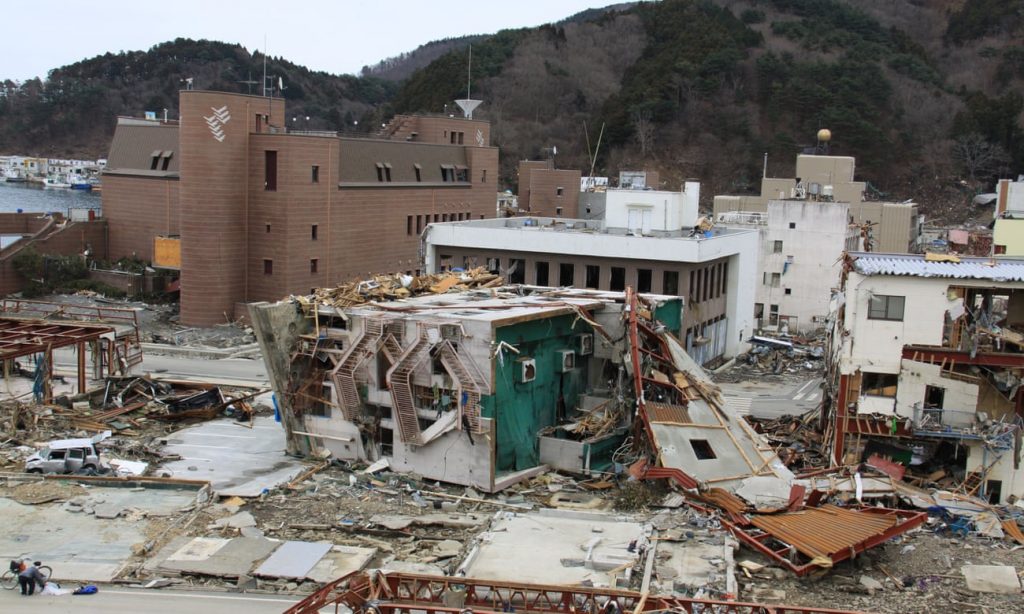
Onagawa town centre 2011 after the tsunami
Richard Vize, regular contributor to the Guardian and a reporter and commentator on public policy and management since 1990, has published a recent article in the Guardian Resilient Cities section of the paper’s website. In addition, Anthony Breach, analyst in the economics team for the UK’s Centre for Cities think tank, focuses on housing and has published on the centre’s blog about learnings from JST and municipalities’ fiscal powers.
In the article ‘We wanted a new vibe’: the Japanese town that outlawed sprawl’, Richard writes:
Japan is dedicating vast resources, funded by higher income tax, to recovering from the earthquake, the tsunami and the accompanying nuclear disaster in Fukushima. Over 10 years, Onagawa will have received 243bn yen (£1.7bn) in state support.
The citizens, struggling with bereavement, loss and dislocation in the aftermath of the tsunami, could have been forgiven for leaving decisions about how to rebuild to officials. They did the opposite: hundreds of residents attended what were sometimes intense public meetings to discuss the future.
The full article can be seen HERE:
Local solutions for the specific problems created by the tsunami, which compounded some of the demographic issues affecting the region with an aging and shrinking population, and the desire of the community to have an impact on how the area was rebuild come out of a different local government settlement in relation to the division of responsibilities with central government, is the result of Japan’s local authorities having a very different structure in relation to administrative powers and accountabilities in the country. On the Centre for Cities blog Anthony writes upon returning from JST:
Local taxation in Japan covered roughly 38 per cent of all local government spending in 2015, or ¥39 trillion (£267bn). This is a similar share to how local government in England is funded and the IFS has identified local taxes as meeting 32 per cent of local government spending from 2017-18, or £43bn.
But Japan’s funding framework gives local government a much larger toolbox than the UK, partly because it has more responsibilities.
The article, which can be seen in full HERE, is part of a series, and those interested in Japanese cities can follow @CentreforCities on Twitter for more from Anthony on what UK cities can learn from Japan. This research was made possible with JLGC London’s support and the Japan Study Tour.
The Japan Study Tour is an annual programme which aims to promote mutual understanding between Japan and European local authorities. JLGC invites applicants from senior-level staff of UK/Northern European local government to join this seven-day tour to look at the current situation and issues related to Japan’s cities and regions.
The next Japan Study Tour will take place in January 2020, exact dates and details of the host authority in Japan, as well as schedule, will be posted online later this year.
For more information, please call 020 7839 8500 and ask for details about Japan Study Tour, or to request the application form and guidance document send an email, marked “JST 2019 Miyagi” to mailbox@jlgc.org.uk (available later in 2019).
NB Tour Costs: JLGC/CLAIR covers expenses incurred during the tour period in Japan including Transportation within Japan, accommodation, meals, seminar materials, admissions to venues and overseas travel insurance
Participants must cover round trip airfare to Japan, any expenses incurred prior to arrival in Japan and after departing from Japan and personal expenses incurred in Japan (e.g. shopping, phone calls, food/drinks from hotel mini-bars, expenses incurred in free time).

